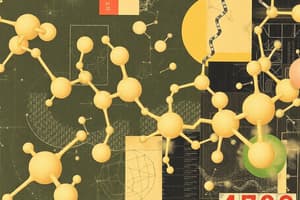Podcast
Questions and Answers
What role do carbohydrates play in living organisms?
What role do carbohydrates play in living organisms?
- Source of energy and cell structure (correct)
- Nervous system function and muscle contraction
- Cell division and protein synthesis
- Gas exchange and waste removal
Which of the following is an example of a monosaccharide?
Which of the following is an example of a monosaccharide?
- Maltose
- Galactose (correct)
- Starch
- Sucrose
What kind of sugar molecules are disaccharides?
What kind of sugar molecules are disaccharides?
- Single sugar molecules
- Triple sugar molecules
- Complex carbohydrates
- Double sugar molecules (correct)
Which of the following is a storage polysaccharide found in plants?
Which of the following is a storage polysaccharide found in plants?
What is the main function of glycogen in animals?
What is the main function of glycogen in animals?
How are disaccharides broken down in the body?
How are disaccharides broken down in the body?
What is the primary function of cellulose in plant cell walls?
What is the primary function of cellulose in plant cell walls?
Which organism's exoskeleton contains chitin as a structural polysaccharide?
Which organism's exoskeleton contains chitin as a structural polysaccharide?
What is the primary role of hyaluronic acid in organisms?
What is the primary role of hyaluronic acid in organisms?
Which polysaccharide determines cell shape and protects against osmotic pressure in bacterial cell walls?
Which polysaccharide determines cell shape and protects against osmotic pressure in bacterial cell walls?
In what way do carbohydrates influence the ecosystem?
In what way do carbohydrates influence the ecosystem?
What is the importance of understanding carbohydrates in studying biological systems?
What is the importance of understanding carbohydrates in studying biological systems?
Flashcards are hidden until you start studying
Study Notes
Biomolecules: Exploring Carbohydrates
Carbohydrates, one of the four main biomolecules found in living organisms, play a vital role in biological systems. They serve as a critical source of energy, contribute to cell structure, and function as essential components in various biological processes. This article will delve into the world of carbohydrates, their functions, and their role in biomolecules as described by the Biomolecules journal.
Carbohydrates, which include monosaccharides, disaccharides, and polysaccharides, are found in bacteria, algae, plants, and animals. They take part in fundamental processes such as energy storage, cell adhesion, and signal transduction.
Monosaccharides are simple sugars and the building blocks of carbohydrates. Common monosaccharides include glucose, fructose, and galactose. These molecules can be combined to form disaccharides such as sucrose (glucose + fructose), lactose (glucose + galactose), and maltose (glucose + glucose).
Disaccharides are double sugar molecules, which are hydrolyzed into their constituent monosaccharides by the body. For example, sucrose is digested into glucose and fructose.
Polysaccharides, or complex carbohydrates, are chains of monosaccharides. Examples include starch, glycogen, and cellulose. Starch, which is found in plants, is a storage polysaccharide that can be broken down into glucose by the body for energy. Glycogen, found in animals, serves as a storage form of glucose. Cellulose, a primary component of plant cell walls, provides structural support and strength.
Polysaccharides such as chitin and hyaluronic acid also play critical roles in various organisms. Chitin is a structural polysaccharide found in the exoskeletons of arthropods like crabs and insects, while hyaluronic acid is a large, unbranched polysaccharide that functions in maintaining tissue hydration and as a precursor of various glycosaminoglycans.
Carbohydrates are not only essential for energy storage and cellular structure but also form the basis of biological communication and signaling. For instance, the bacterial cell wall consists of peptidoglycan, a polysaccharide that determines cell shape and protects against osmotic pressure.
Additionally, carbohydrates can act as recognition molecules, facilitating cell adhesion. They are a crucial component of the extracellular matrix and help build tissues, such as bone and cartilage.
Carbohydrates also influence the ecosystem, as they are a primary energy source in aquatic and terrestrial food webs. Aquatic macrophytes, such as algae and plants, are a major source of carbohydrates for herbivores and detritivores.
In summary, carbohydrates are fundamental biomolecules that play essential roles in energy storage, cell structure, and communication. They contribute to the basic structure and function of all living organisms, from bacteria to humans. Understanding carbohydrates and their roles in biomolecules is crucial for studying biological systems and their interactions with the environment.
Studying That Suits You
Use AI to generate personalized quizzes and flashcards to suit your learning preferences.




